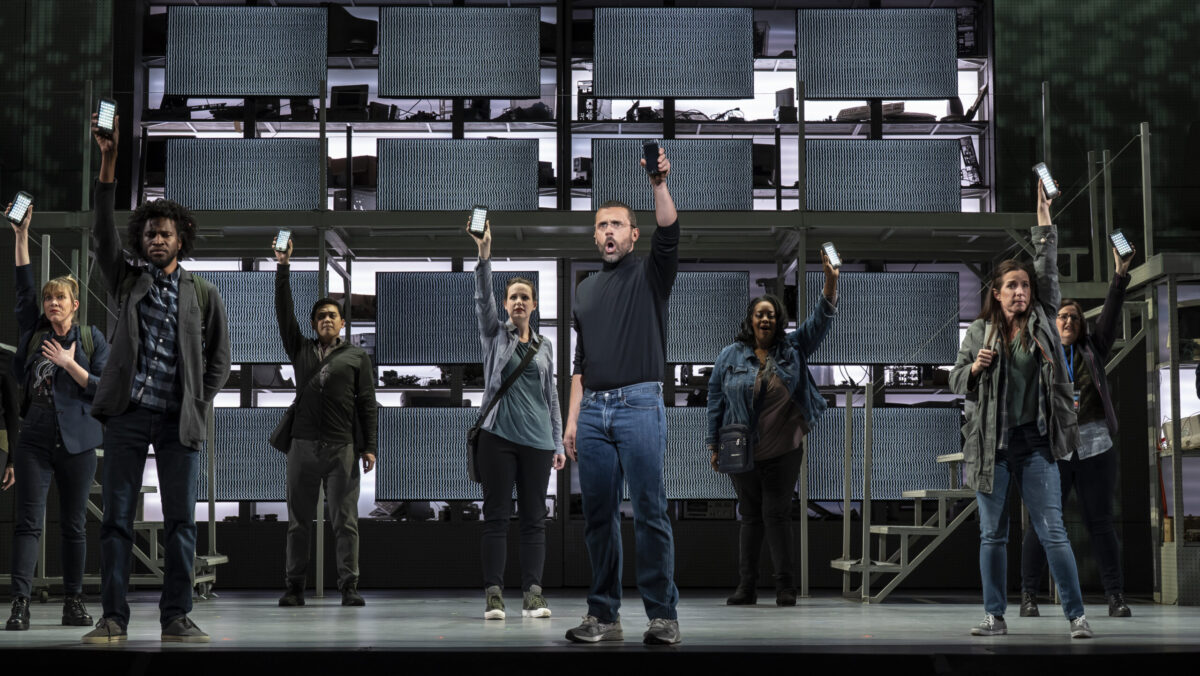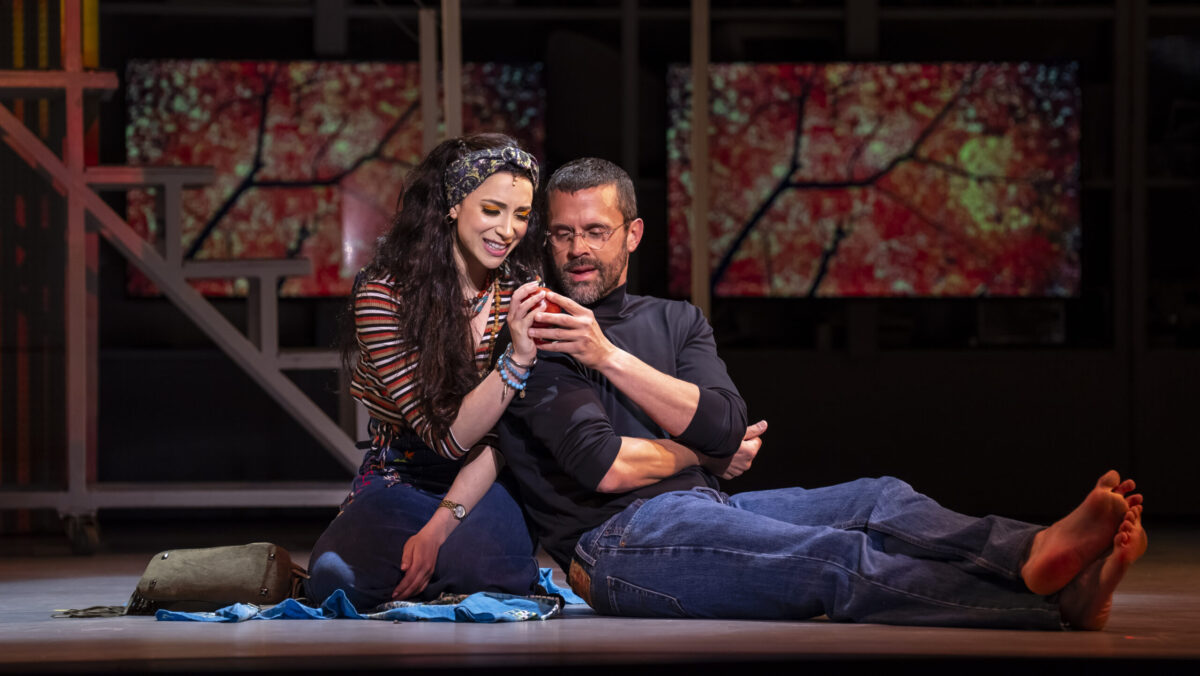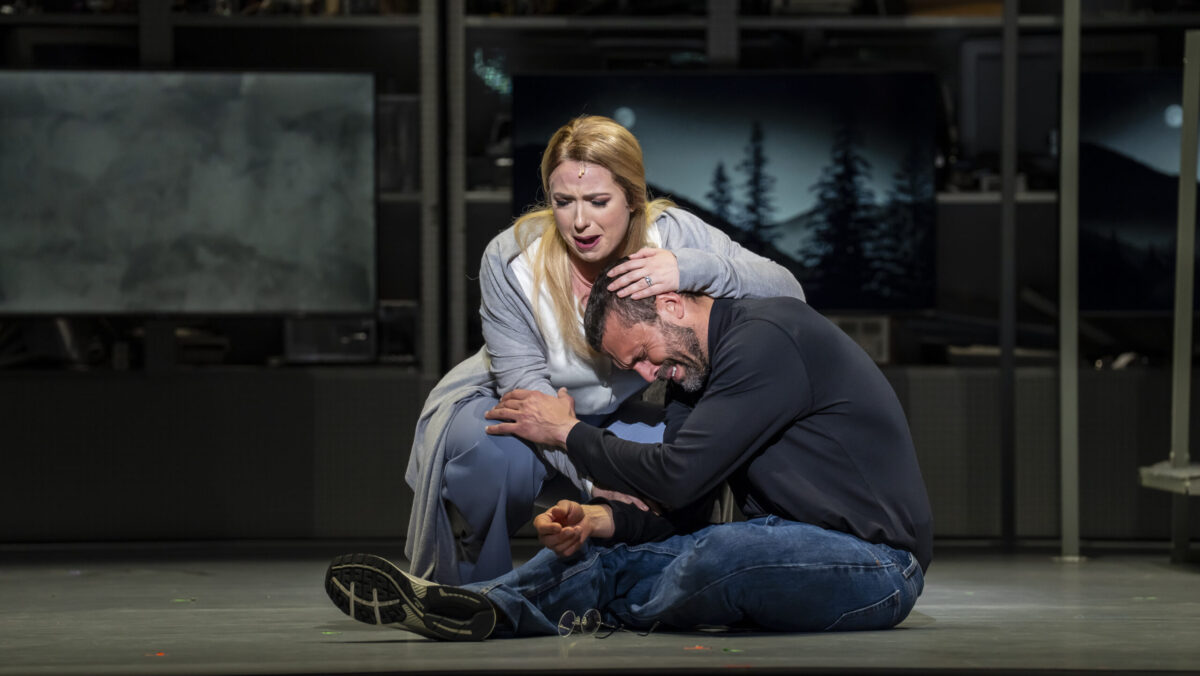

Scott Suchman
Washington Nationwide Opera ended its lengthy spring hiatus on 2 Could with a manufacturing of Mason Bates and Mark Campbell’s The (R)evolution of Steve Jobs within the Kennedy Middle Opera Home.
Since premiering at Santa Fe in 2017, Steve Jobs has loved an unusually vast reception for a brand new opera, with stops in Seattle, Atlanta, and San Francisco amongst others. Little question the lengthy path of curiosity in all issues Jobs following his loss of life in 2011, in addition to the novelty of an opera on a up to date life, has helped to maintain a way of buzz going for the present. But for all of the up to date material, The (R)evolution of Steve Jobsis commonly a regrettably typical piece of theater.
Mark Campbell’s libretto delivers an elaborate “scenes from a life” construction (a complete of 19 tableaux in about 90 minutes) that works diligently to distill main plot factors from throughout Jobs’s grownup life. The prologue, a flashback to Jobs’s childhood the place he’s given a piece desk and solemnly inspired to “take issues aside,” begins to trace on the biopic tropes and canned dialogue that may prevail all through the piece.
Scenes proceed to focus on Jobs as irascible workaholic, visionary felled by hubris, rockstar flirting with megalomania, good buddy lured away by ambition, and many others.–themes that every one make a sure logical sense however present little in the way in which of shock or rigidity. Some moments stand out, just like the dramatization of Jobs on the 2007 announcement of the iPhone as a malign messianic determine, or the startling cruelty with which Jobs abandons his illegitimate daughter. However largely the story beats and interactions between characters really feel deeply predictable.
Which isn’t to say I used to be bored, not less than for the primary half or so. The present strikes at a brisk tempo and anyone state of affairs doesn’t overstay its welcome as we see Jobs’s early alliance with Steve Wozniak, a youthful relationship, the meet-cute along with his future spouse at a lecture, and seminal moments influencing his pondering.
However issues begin to drag within the again half because the libretto and rating builds a disaster level out of Jobs’s mid-80s excesses and battles with the Apple board. Jobs’s descent is depicted in an intense musical sequence that’s spectacular at first however in the end appears one dimensional. The size and tumult of this psychological breakdown is the catalyst for Jobs’s redemption, as we then transfer into the present’s prolonged decision about discovering refuge in marriage and household. The ultimate set piece is a very lengthy scene of Jobs’s ghost attending his personal funeral that takes a flip for the maudlin as spouse Laurene presents direct-to-audience bromides about his sophisticated legacy.
Composer Mason Bates is a well-recognized face across the Kennedy Middle, who recurrently unleashed his turntables on the live performance corridor again when he served because the Middle’s composer-in-residence within the mid-2010s. Bates eschews the extra aggressive electronica for a really particular sound world right here, utilizing surprising devices like electrical guitar to create one thing that sounds trendy and technology-adjacent but nonetheless natural and complementary of the human voice (not less than when these voices are amplified). There may be some memorable vocal writing right here, too, just like the Jobs character’s central aria riffing on the similarities between computer systems and devices, although the rating is much less profitable at growing and deepening the two-hander scenes.


Scott Suchman
The (R)evolution of Steve Jobs isn’t a poorly made opera, however it’s simply so relentlessly mid, as the youngsters would possibly say. Certainly, it leaves one mulling the boundaries of the operatic type, and whether or not such an easy retelling of key moments from Steve Jobs’s life wouldn’t be higher served as a chunk of straight theater or possibly a restricted Netflix collection the place extra nuanced characters and element concerning the topic’s world may very well be dropped at the fore. Whereas there are glimpses right here of what a more practical and adventurous operatic method would possibly appear to be, that is in the end a really fundamental remedy of the fabric with little to additional problem and interact the viewers.
The punishing title function was ably dealt with right here by baritone John Moore, who has made Jobs one thing of a specialty over quite a few productions lately. His steely sound properly held the massive set items collectively and revealed a level of tenderness in additional lyric passages. He additionally credibly met the appreciable dramatic calls for right here, although regardless of 90 minutes of intense scrutiny, the Jobs character stays largely opaque on the finish.
A powerful supporting forged did a lot to enliven the opposite key elements. Wei Wu, a former WNO Cafritz Younger Artist, introduced his distinctive bass and a straightforward gravitas to Jobs’s deceased mentor Kobun, who features as a type of spirit information. Tenor Jonathan Burton gamely leaned into the comedian materials for the Steve Wozniak character, displaying off a sexy sound notably in Wozniak’s passage scolding Jobs.


Scott Suchman
Winona Martin’s heat mezzo yielded an interesting presence as partner Laurene Powell Jobs, whereas soprano Kresley Figueroa’s brilliant soprano shone within the wounded passages because the mom of the kid that he ruthlessly tries to suppress.
Lidiya Yankovskaya led the WNO Orchestra in a properly textured studying of the rating, efficiently deploying driving tempi that added pleasure to the massive ensembles. Members of the Washington Nationwide Opera Refrain (ready by Steven Gathman) made fantastic contributions as effectively, bringing readability and element to the tough passages for Apple staff, journalists, and many others.
The well-traveled manufacturing, initially created by Tomer Zvulun and directed right here by Rebecca Herman, successfully manages the work’s many transferring items. Units by Jacob Climer mix a easy taking part in area and catwalk with banks of flat screens in addition to projections towards the flats (by Katy S. Tucker). It was a suitably practical machine, although additionally felt a bit generic for an opera a few grasp of design; one may simply think about this being reused for a Rigoletto set in an workplace or one thing.